|
May 31, 2004 For three intensive months, we teach management and computer We watch as the neighbor’s gray tabby toys with a snake slithering out from under the fence. It curls to strike. The cat backs away. It relaxes. The cat approaches again, smacking it with her paw. There are lots of snakes around now, made homeless by monsoon waters filling low places under houses. On down the street, a woman shrieks as another chases her down the sidewalk, then slithers off into a school yard. She warns the children, “Mee gnu, na ka!” Like homeless snakes, ethnic refugees seek out
higher ground, safer shelter here in Thailand. They are tolerated, warehoused in remote camps along the border, cut off from civilization, four hours away by narrow dirt roads,
carved in the mountainside. Roads wash out in the rainy season. Mud fills the deep ruts. Wheels spin and slide. Bamboo poles form crude bridges
over gaps dropping off to dense jungle below, a thousand feet maybe…maybe more. This is where they’ve gone…the students…back to camps with names like
Mae Ra Moo, Umpien Ma, and Htorn Him. Some have never seen their homes. In January, Mae Khong Ka was forced to
relocate. The refugees, over 15,000 of them, now live farther south and closer to the Burmes border in Mae La Oo, a Some of our students plan to cross back into Burma, searching out homes and families they haven’t seen in years: “We can take a boat down the river, at night,” Au Leng “It’s a hard climb over the mountains,” said one young woman. “Easy to get malaria.” “We stay one night in the jungle, I think…maybe two,” said another.” “What about landmines?” we asked. “Yes, it’s a problem.” a third replied. “We have to be careful. I am a little afraid. But there is a youth conference in Karen State and I haven’t seen my mother for five years.” That was two weeks ago. Today, the Chiang Mai news reports “If any refugee went back to their homeland, they will not be allowed to return to Thailand. If they try to return, they will be repatriated to their homeland.” We hope they stay safe. Teaching is a lot of work but never have we seen students so eager to
learn, so hungry for knowledge. This year there were twelve from Karen State, one Karenni, one Shan, and two Mon, all young (20-27 years), all
bright. Saw Kee attended first year class for a second time because last year was a blur for him. The day he arrived in Chiang Mai, he learned that
both parents and two borthers had been butchered in their village by the Burmese SPDC soldiers. Twelve months later, the grief had lifted a little. He
could laugh again, watching world cup soccer on our television, and cheering his favorite team. Tee Moo was the youngest, bright and pretty, but half blind. (The program bought her glasses.) Her family ran away from Burmese soldiers when she was young. They hid in the jungle seeking food, seeking safety. She tells this story: “I was only a few years old when the soldiers came to our village all the time…. We were hiding from them in the forest…From there we saw the smoke from our houses…. I will never forget that. When we went back… our village was all gone. If the soldiers would have seen us they would have killed us all. We decided to go to a refugee camp in Thailand. Many other people went, too. We walked and walked and walked. We had to stay in the forest for a few months. I was so hungry. We couldn’t stay in the same place; we had to move again, again, again because of the soldiers. We ate coconuts and some vegetable we found in the forest. At the end we took a boat across the river to Thailand. When we got to the camp, we found people we knew from before and we could stay with. Later we built our own house. My mother died a few years ago. My father was a farmer back in Burma. Now he doesn’t do much because we cannot farm in the mountains.” Tee Moo watched the movie “Black Hawk Down” with other students. The violence upset her, but talking about her experiences with us, “this is very good,” she said. Au Leng is 27 years old, our oldest student and Karen. He has been in
Chiang Mai for nearly three years taking the Au Leng was a frequent visitor at our house, talking of past experienes and future dreams, or just relaxing on hot afternoons with HBO or Cinemax. Now he’s off to Burma to attend the youth conference in Karen State, then returns to Mae La Oo, the new refugee amp, to share a dormitory with other young unmarried men. Maybe he’ll teach about computers. Maybe we will hear from him again, by letter or by e-mail when he has a chance to make the four hour trip to Mae Sariang ... maybe not. We return to the U.S. in September, leaving snakes and refugees behind, We miss family in U.S., grandkids’ screams, smells of Christmas, but we will miss our families here as well, and the sizzle of stir-fry as it hits hot oil, the flash of orange as a monk walks past, the drone of chants from temple walls. We will miss the shout “bei luey!” as the bus speed away from a stop, tuk-tuk fumes, and dogs howling when the national anthem plays at 6 p.m. We will miss standing for the King’s song before the main feature in the movie theathre and the politeness of ‘wais’. There won’t be tropical bird sounds to wake us in the morning, nor night time tukay songs. Our home in Fort Collins will be under lease through May 2005. Until then, Grove, Oklahoma will be our base. The AEIOU Programme leaders have asked us to return to Thailand in January, to teach for whatever time we can. At this point, we don’t know if it will be possible. Here, we are finishing up revisions of the community management textbook for our students and writing grant proposals to the Ford Foundation and the Global Women’s Fund. We are also putting together a short video of our experiences here: teaching in the program, trips to camps, sharing meals and evenings with students. We are gathering small items for fund-raisers in the States. With students gone and knowing we only have three months left, our remaining time seems more difficult. Humidity soaks our cloths. Leather shoes are damp from rain. Feet ache from endless walking, toes tortured by uneven and obstructed walkways. Like the snakes, rains will drive us from this home to seek higher ground, safety and shelter in another. We wonder what sticker shock waits to smack us. That’s all from Thailand. Pop gon mai! Carol & Norbert
Pictures: Stories above are true, but names have been changed to protect the students. |
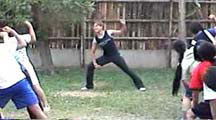 The worst of today’s monsoon rain ended. Slowly, we climb the hill toward the main road, passing the school. Sixteen
students and half a dozen staff members and visitors live there, pouring over books, playing a game of ping-pong, kicking the soccer ball high with a head shot, Saw Pa practicing
guitar. Daw Kee singing karaoke in the back room, Tee Mu chopping oinions at the round wooden table, and
The worst of today’s monsoon rain ended. Slowly, we climb the hill toward the main road, passing the school. Sixteen
students and half a dozen staff members and visitors live there, pouring over books, playing a game of ping-pong, kicking the soccer ball high with a head shot, Saw Pa practicing
guitar. Daw Kee singing karaoke in the back room, Tee Mu chopping oinions at the round wooden table, and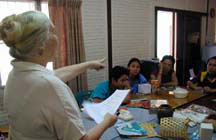 programming. Daily rhythms of the house
organize our lives. In April, heat builds. The rhythm slows on drowsy afternoons. It quiets as lessons are learned. Quite conversations are shared under the shade of the mimosa. It
quickens with laughter and aerobics, a game of takraw. For three months, we share meals and stories with the students, music, gmes, and lessons, but today the house is empty. That rythm is still and we don’t
programming. Daily rhythms of the house
organize our lives. In April, heat builds. The rhythm slows on drowsy afternoons. It quiets as lessons are learned. Quite conversations are shared under the shade of the mimosa. It
quickens with laughter and aerobics, a game of takraw. For three months, we share meals and stories with the students, music, gmes, and lessons, but today the house is empty. That rythm is still and we don’t 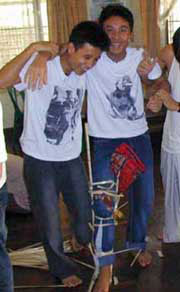 quite know what to do with ourselves.
quite know what to do with ourselves.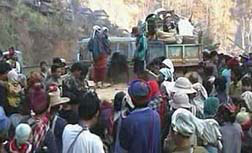
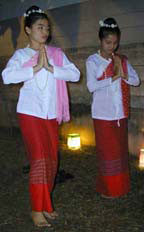 stone’s thrown from enemy soldier outposts. Thai troops promise to protect the refugees but can’t be everywhere at once, and the
Burmese are well known for their cross-border raids, killing people, burning homes, raping women, and stealing pigs.
stone’s thrown from enemy soldier outposts. Thai troops promise to protect the refugees but can’t be everywhere at once, and the
Burmese are well known for their cross-border raids, killing people, burning homes, raping women, and stealing pigs. 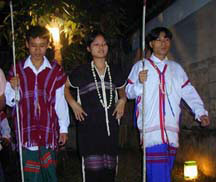 told us, “then walk for two days in the jungle.”
told us, “then walk for two days in the jungle.” 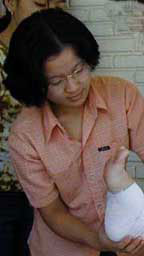
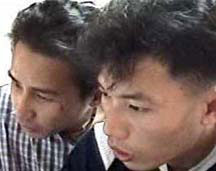 AEIOU courses and teaching about computer hardware. Back when he had travel documents, he was able to study for three months in the Philippines at a technical
college. A former AEIOU teacher made it possible for him. Since then, he’s tried to gain admissions to a computer science program near Bangkok and again in Chiang Mai. Our NGO would have sponsored him. With no
valid passport or visa, it’s impossible. Even with one, many foreign students are granted only one to three months at a time. He’s disappointed. So are we.
AEIOU courses and teaching about computer hardware. Back when he had travel documents, he was able to study for three months in the Philippines at a technical
college. A former AEIOU teacher made it possible for him. Since then, he’s tried to gain admissions to a computer science program near Bangkok and again in Chiang Mai. Our NGO would have sponsored him. With no
valid passport or visa, it’s impossible. Even with one, many foreign students are granted only one to three months at a time. He’s disappointed. So are we.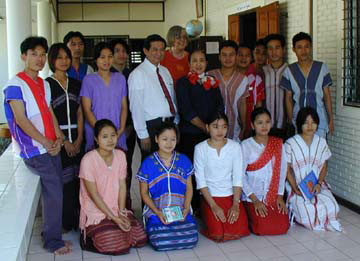 but their stories stay with us. It’s been two years
since we first arrived and living here has changed us. No matter what we gave away, we received so much more in return.
but their stories stay with us. It’s been two years
since we first arrived and living here has changed us. No matter what we gave away, we received so much more in return.